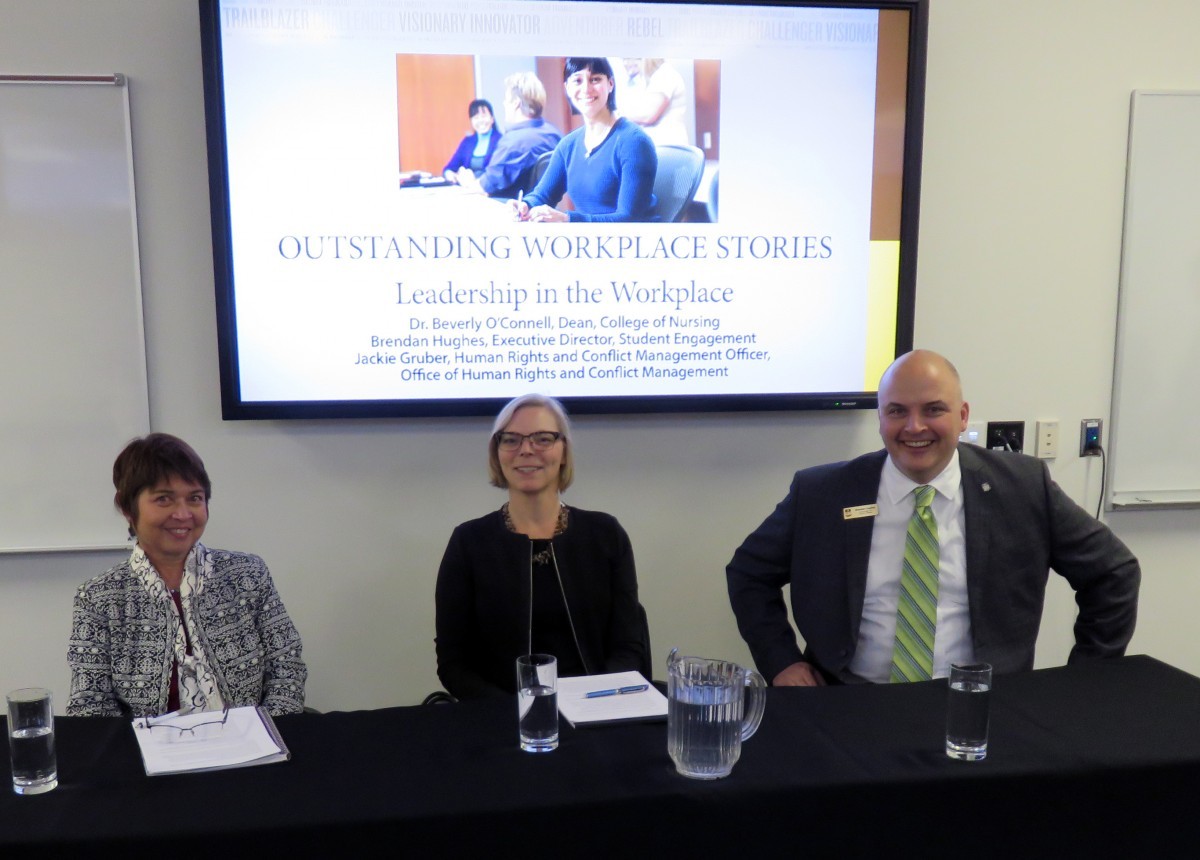
Beverly O'Connell, Jackie Gruber, Brendan Hughes
Being a leader is ‘more than how many people report to you’
Outstanding Workplace Stories panelists share stories about leadership
When dean of the College of Nursing Beverly O’Connell was a young manager of a large emergency centre with lots of chaos and activity, she learned to be a leader by doing—“by learning from mistakes and watching role models,” as she puts it.
O’Connell was one of three panelists speaking at the Outstanding Workplace Stories series event on Nov. 13 about how they developed their leadership skills. The series consists of noon hour panel discussions that feature members of our university community sharing their stories of success in the workplace.
The other two panelists were Jackie Gruber, human rights and conflict management officer, office of human rights and conflict management and Brendan Hughes, executive director of student engagement.
Leadership is an iterative process, they said — something you learn over and over again. Hughes added that the practice is necessary: “You need to practice. Being a leader takes 10,000 hours. You need to know your areas of strengths and areas of improvement.” He began as a camp counsellor who developed his skills by working with young people and students.
Gruber started off as a mediator and always remembered the advice from her philosopher professor: never burn bridges.
O’Connell suggested that a mentor who can give feedback can help sharpen one’s leadership style. She said that as a young manager, she found “a buddy that she could run with. Get a buddy who’ll tell you anything about your style and suggest ways you can improve.”
Greg Juliano, associate vice-president (human resources), who moderated the event, pointed out that leadership does not equal how many people report to you. “Being a leader is more than this,” he said.
Other tips emerged, including being positive, passionate and kind. Panelists also had advice for avoiding common mistakes of inexperience, such as running with an idea rather than aligning it with the goals of the organization or charging in as boss instead of being open to all perspectives and acknowledging others’ efforts.
Also discussed was being unprepared when going into a project. The audience was reminded of the importance of preparing for meetings by anticipating pros and cons and researching the facts. “Prior planning prevents pretty poor performance,” said Hughes.
Connect with colleagues
The panelists ended the event by talking about the importance of connecting with their teams. Gruber shared how her office has quick check-in meetings every morning to see if people have any questions or need assistance. She also likes to connect on a personal level, chatting about the everyday.
“Getting to know the temperature in the room,” as O’Connell said, is important. She walks the corridors in the College of Nursing to talk with faculty and staff because she wants people to know that she is concerned about their issues. Every three months, O’Connell and her team celebrate their accomplishments with an after work gathering.
Acknowledging others’ good work in person or via email is important, said Hughes. He encouraged the listeners to build relationships on campus, go for lunch or coffee with others.
“Celebrate every day!”
To read more about the topic of being a leader, the panelists recommended the following:
- The Leadership Challenge: How to Make Extraordinary Things Happen in Organizations by James Kouzes and Barry Posner
- Conflict Management Coaching by Cinnie Noble
- The Art of War by Sun Tzu
Outstanding Workplace Stories takes place three to four times a year.
To suggest ideas for future topics, contact David Grad, facilitator & programs coordinator, human resources, 204-474-8469, david.grad@umanitoba.ca






